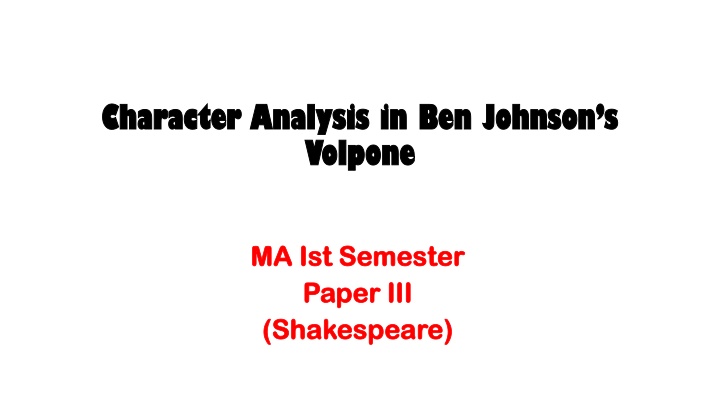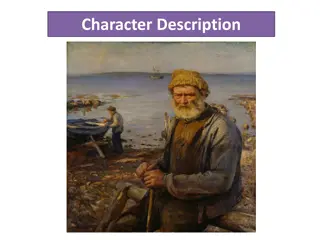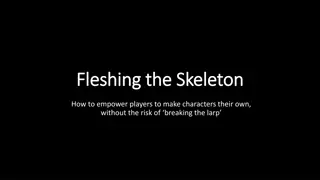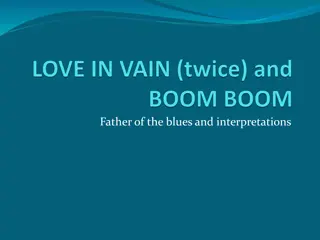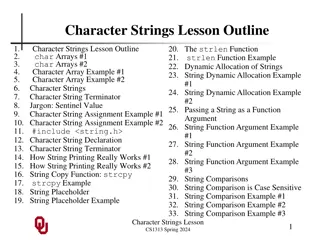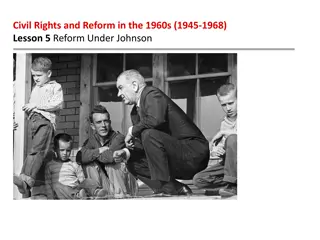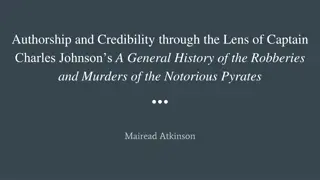Character Analysis in Ben Johnson's "Volpone
Character analysis of key characters in Ben Johnson's play "Volpone" including Corbaccio, Voltore, Mosca, and Volpone. Each character is dissected based on their traits, motivations, and role in the intricate plot, showcasing their unique personalities and flaws. The analysis delves into the spiritual blindness of Corbaccio, the greed and cunning nature of Voltore, the parasitic existence of Mosca, and the trickster persona of Volpone, providing insights into the complexities of human nature portrayed in the play.
Download Presentation

Please find below an Image/Link to download the presentation.
The content on the website is provided AS IS for your information and personal use only. It may not be sold, licensed, or shared on other websites without obtaining consent from the author.If you encounter any issues during the download, it is possible that the publisher has removed the file from their server.
You are allowed to download the files provided on this website for personal or commercial use, subject to the condition that they are used lawfully. All files are the property of their respective owners.
The content on the website is provided AS IS for your information and personal use only. It may not be sold, licensed, or shared on other websites without obtaining consent from the author.
E N D
Presentation Transcript
Character Analysis in Ben Johnsons Character Analysis in Ben Johnson s Volpone Volpone MA MA Ist Ist Semester Semester Paper III Paper III (Shakespeare) (Shakespeare)
Character Analysis in Ben Johnsons Volpone Corbaccio The carrion crow is old and decrepit, deaf, round of back, and very avaricious. Partially deformed, this fool completes his transformation from nobleman to parasite by being tricked into disinheriting his son. The irony of Corbaccio's spiritual condition is wrapped up in his physical condition: He really expects to outlive Volpone and inherit his wealth! This is termed as spiritual blindness not physical blindnes.
Character Analysis Voltore The vulture is one of the three birds of prey that circle around the fox, greedy and full of expectation. He is a lawyer and consequently has a weakness for wills. By using his legal knowledge he advocates injustice in order to possess Volpone's fortune. Mosca fools this gull by using the advocate's own strategies. He tells Voltore the biggest lie and documents it with elements of well-known facts. Voltore is tricked by his own folly. He believes that he can make the whole world believe that a lie is the truth. He fails to observe that he might be tricked and cozened himself.
Character Analysis Mosca Mosca (the gadfly) is a parasite. He is only one step higher in the social scale than the three fools of Volpone's household: the dwarf, the hermaphrodite, and the eunuch. He is socially deformed, a fellow of no birth or blood. Mosca lives by his wits; he has no possibility of advancement in the Venetian world, and he is therefore free of the folly of greed. He takes his needs from the treasures of others, and he takes only his daily needs. The parasite's freedom from the normal ambitions of human nature makes him a formidable judge of it. He uses this knowledge to mock the frailties of his fellow men, and his only pleasure is in his wise observance that, if he is not noble, they are parasites. It is only when Volpone's need for cozening puts the weapon of financial advancement into Mosca's hands that the gadfly tries to live by his own means. Mosca's sudden opportunity for gain makes him vulnerable to the folly of greed, which eventually pulls down the charming and inventive rogue. This comic character flaw is particularly ironic in Mosca. Did he for a moment forget that "almost all the wise world is little else, in nature, but parasites or sub-parasites"?
Character Analysis Volpone Volpone (the fox), the protagonist of the play begins the action by his intriguing acts. It is the audience's interest in the manner of his downfall that preserves the dramatic tension until the final curtain. Volpone is a simple character. He is a trickster who delights in disguises and intrigues. Volpone loves to trick people into giving him their most prized possessions. When he has secured these through cunning rather than ordinary means, the value is increased in the fox's eyes. In short, his character treasures the chagrin of those he has cozened more than the wealth received as a result of the cozening. There is excellent comic sense in the simplicity and single-mindedness of Volpone's character. His insatiable desire to trick people is characteristic of the figure of the fool. Volpone is a nobleman. The plot shows his fall from the position of Venetian nobleman to the social position of a fool. Volpone's character flaw, the desire to trick people, has brought him to the final curtain. He starts out playing the fool and ends up by being one. He fulfils Mosca's prescription of people: "Almost all the wise world is little else, in nature, but parasites or sub-parasites."
Character Analysis Corvino The raven is the last of the greedy trio, a peacock proud of his beauty, Celia. This bird of prey is an exceedingly jealous husband who guards his wife with great care. Nonetheless, his greed persuades him to demand that Volpone cuckold him! When at last he discovers the error of his ways, he is too proud to reveal his foolish vanity. The paramount character quality of the three divergent birds of prey is their love and desire to possess money
Character Analysis Celia and Bonario Celia is Corvino's wife; she is also an important plot device. It is Volpone's desire that delivers her to his doorstep. Her presence there gives Bonario a chance to save her. Bonario is good and sentimentally romantic character. Celia and Bonario are foolish as well as innocent. They look at life in Venice through the eyes of lovers of melodramatic, romantic fiction. Therefore, they are not human beings who suffer through uncontrollable circumstances. Rather, they seriously misjudge the people they should know best because of their naive ideas about human nature. If the gulls seem inhuman in their total greed, Bonario and Celia are equally inhuman in their purity. Their folly is more silly than vicious, but it is, nonetheless, folly.
Character Analysis Sir Politic, Lady Would-be, and Peregrine Sir Politic, his wife, Lady Would-be, and Peregrine are travelers from England. Sir Pol and his lady are English tourists trying to go native. They are hilariously inept at playing Italian games and hopelessly ignorant of the ways of the foreigners. They are parrots mimicking the action of the master plotters without ever understanding what they are doing. Underneath it all, they are innocent and stupid, but likable and English. Peregrine serves as Sir Politic's confidant. He uses the English knight for his merriment but never becomes involved in the main action of the play.
THANK YOU! THANK YOU!
